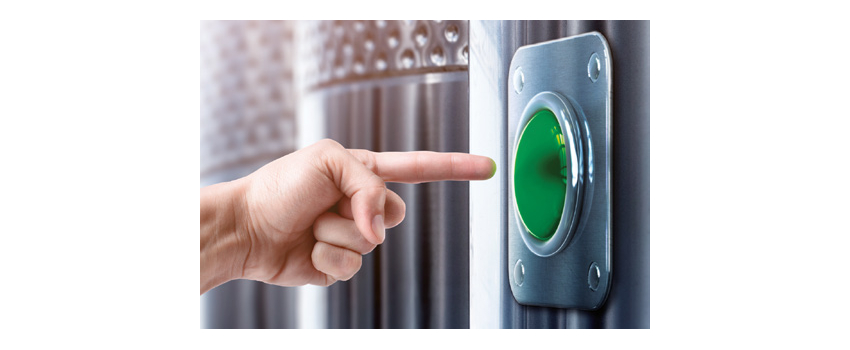
Restarting stuck alcoholic fermentation : a simple, efficient protocol
Publiée le 13/03/2018 13:25Problems with alcoholic fermentation can be avoided by taking preventative measures as part of good alcoholic fermentation management. These measures include choosing an appropriate yeast; following the rehydration protocol; using yeast protector; sensible, balanced management of yeast nutrition; oxygen and temperature management, etc... However, unexpected factors can cause fermentation hitches. The problem must be identified and tackled to avoid disastrous consequences for wine.
Protocols to restart fermentations are often time-consuming, long and involved and the results are not always convincing.
To take up the twofold challenge of ensuring speed and ease of use/efficiency, Lallemand applied its expertise to develop a new, optimized protocol using two major innovations: Uvaferm 43 RESTART™ and ResKue™.
Detoxification capacity during vinification
ResKue™ is the first wine yeast cell-wall product selected for physical and biochemical properties giving a high capacity to adsorb fermentation inhibitors.
Lallemand’s R&D has focused on improving yeast cellwall characterization since 2006. As a result of this research to increase yeast cell-walls’ adsorption capacity, we have selected a wine yeast and specific autolysis protocol (Pradelles et al., 2009). We have also confirmed that prior rehydration of yeast cell walls is an important step for enhancing their adsorption capacity.
In addition, we have developed a new method to analyse the biochemical composition of yeast cell walls and assess their physical properties (Schiavone et al., 2014 and 2015).
Phytosanitary products (fungicides, herbicides and insecticides) seriously affect yeast viability and can compromise the end of fermentation. Recent research has also shown that these products can have a negative impact on aroma production (especially esters) and wine’s fruitiness (Noguerol-Pato et al., 2014). The use of ResKue™ can significantly decrease the residues of the phytosanitary products as shown in Figure 1.
Phytosanitary residues often cause problematic alcoholic fermentation. In these situations, grape must can be detoxified before alcoholic fermentation is even started to limit the onset of these problems.
Similarly, during problematic alcoholic fermentation, other toxic compounds such as short- and mediumchain fatty acids (SMCFAs) reportedly inhibit alcoholic fermentation. These fatty acids may affect the fermentation restart. Detoxification can be attempted after 2/3 of alcoholic fermentation when you suspect that the end of fermentation will be laborious. Figure 2 is an example of ResKue™ ’s effectiveness at eliminating toxic fatty acids (SMCFAs).
For stuck fermentation, it is therefore virtually essential to detoxify wine with ResKue™ before beginning a fermentation restart protocol. ResKue™ consists of selected wine-yeast cell walls with highly characterized physical and biochemical properties. ResKue™ has a high adsorption capacity and is an effective tool for eliminating phytosanitary product residues and SMCFAs.
Optimizing alcoholic fermentation restart for even more efficiency
When AF is stuck, must usually contains more fructose than glucose, whereas most Saccharomyces cerevisiae yeasts prefer glucose. To restart alcoholic fermentation, it is therefore especially important to choose a yeast with high fructose affinity. Uvaferm 43 RESTART™ ’ has been shown to be the best fructophilic yeast currently available. This is due to its high expression of genes in the HXT3 family encoding for specific fructose carriers.
To improve performance and make it as easy to use as possible when restarting fermentation, Uvaferm 43™ ’s production process has been completely readjusted.
The new process has resulted in Uvaferm 43 RESTART™, which is even more resistant to hostile wine conditions during stuck fermentation (high alcohol content, residual toxicity, etc.).
Uvaferm 43 RESTART™ is produced in pre-acclimatized form, including specific micronutrients to enhance yeast’s resistance in this medium, as well as survival factors such as specific sterols and polyunsaturated fatty acids to strengthen the yeast membrane.
The yeast cells are thus more robust, have a lower post-inoculation mortality rate, and acclimatize faster in must. The fermentation restart protocol can therefore be simplified, reducing it to a few steps since the yeast is already pre-adapted.
As well as simplifying the protocol, this new procedure is more efficient, as is shown by figure 3. Using Uvaferm 43 RESTART™ during this wine’s stuck fermentation saved one week compared to using standard Uvaferm 43™ in the same conditions.
Simpler and more efficient: discover the new protocol for restarting fermentation in just a few steps
Thanks to the combined action of these two innovations, Lallemand – in partnership with Inter Rhône (France) – has developed an optimized protocol for restarting fermentation. This protocol is efficient and easy to use since it includes just one acclimatization phase.
In Conclusion
By developing ResKue™ – a unique wine-yeast cell-wall product with high/medium detoxification capacity – and Uvaferm 43 RESTART™, Lallemand has produced a much simpler, extremely efficient protocol for restarting fermentation that meets the challenges facing winegrowers in this situation.
For more information on this topic, contact our Lallemand Oenology experts here on Winemak-in or send us a direct message.
You can also go to our Website : www.lallemandwine.com or contact us :
Lallemand France/Switzerland/China
Lallemand SAS
fb.france@lallemand.com
Tel: +33.5.62.74.55.55
Lallemand Italia
fb.italia@lallemand.com
Tel: +39 (0) 45 51 25 55
Lallemand Península Ibérica
fb.espana@lallemand.com
Tel: (+34) 91 4415053
Lallemand Germany, Austria, Greece, Hungary, Israel, Cyprus, Malta, Poland
fb.eurocenter@lallemand.com
kburger@lallemand.com
Tel/Fax: (+43) 27 35 80 147
Ferment Croatia, Slovenia, Macedonia, Romania, Russia, Serbia, Moldavia, Ukraine
nmaslek@lallemand.com
Tel: (+385) 98 30 24 62
Lallemand North America, Mexico, Japan, Taiwan
gspecht@lallemand.com
Lallferm S.A. Chile, Argentina, Uruguay, Brazil, Ecuador, Colombia
pcarriles@lallemand.com
Tel: +54 (261) 425 67 89
Lallemand Australia , New Zealand
australiaoffice@lallemand.com
Tel: 61 (8) 276 1200
Lallemand South Africa
ploubser@lallemand.com
Tel: +27 21 913 7555


